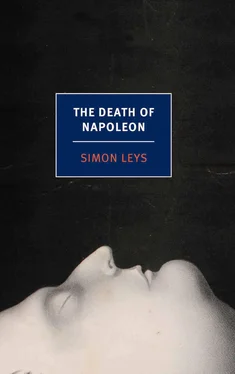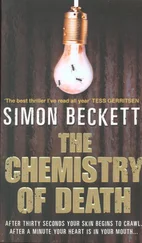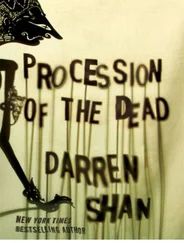It took him no time at all to pack his bag. He left on board most of his possessions — oilskins, sea boots, etc. — which would be of no further use and would only add weight to his luggage.
He went ashore. Incapable of rational thought, all he could do was to repeat to himself the last instructions he had received ten months earlier. He knew them by heart, as they had been the mainstay of his hopes all through the long days at sea.
The wharf was deserted. No sign of a top hat. Not even a barrel.
He waited for a long time, pacing up and down.
From time to time, a lone passerby would walk along the quay. He gave a start each time anyone appeared. Standing in a conspicuous spot, he would anxiously scrutinize the face of every newcomer in the hope of discovering some secret sign of identification. But the dock-worker, hurrying home, did not even look up as he approached. And the ragged old woman picking out peelings from between the cobblestones with her hook was so absorbed by her work that she did not pay him the slightest attention.
A rain squall drove him to take shelter in an open shed. The cold was beginning to go right through him. He stood there, lost and dejected, like a kite cut adrift from its line and dumped by the wind at the back of some vacant lot, hidden from view.
He had finally lost the only thread that had guided him back since his escape! A single grain of sand had derailed that wonderfully precise machine, which would still continue to turn, but would turn blindly and to no purpose. Napoleon was left to his own resources; from now on, he would have to struggle alone, groping in the dark to find his own way back toward the glorious dawn of his future.
BEFORE MAKING any new plans, he had to find shelter for the next few days.
As he did not have the energy to walk very far, he entered the first private hotel he came to, in a narrow street that wound around the foot of the cathedral.
In the hallway, there were aspidistras in highly polished brass pots; a red carpet led to the stairs. These signs of bourgeois prosperity made him apprehensive about the bill, but it was too late to retreat.
His room, crowded with elephantine furniture adorned with antimacassars and lace, was small and smelled of wax polish. Once alone, he began to count his money. All he had was his seaman’s pay. It was a modest sum, but it should be enough to meet the expenses of the journey to Paris. However, before setting out on his final and decisive venture, he needed first of all to regain his strength. At the risk of making serious inroads into his capital, he decided to rest for a day or two in these quiet surroundings.
For the next twenty-four hours, he scarcely left his room. At this crucial turning point in his destiny, he needed time to reflect as much as he needed rest.
Yet it was almost impossible for him to collect his thoughts. There was some important festival going on in the town. What were they celebrating? He intended to find out about it from the maid who cleaned his room, but then he forgot to ask her. What did it matter anyway?
Breaking away from the processions that must have been marching down the boulevards, small groups of people wearing grotesque masks sometimes wandered into the narrow street, dancing and laughing down below his window. The blare of brass bands could be heard in gusts now and then.
Then, on Sunday afternoon, there was a carillon concert in the cathedral. The bell tower, whose massive walls plunged the entire little street into perpetual gloom, blocked the horizon of Napoleon’s window like a dark cliff. For three whole hours, his room was taken over by the bells. It was terrifying. The big bells boomed and roared mercilessly, while the smaller bells spilled out tinkling cascades of sounds. His room, the boardinghouse, the entire street shook under the pounding of those enormous ringing hammers. Deafened and stupefied, Napoleon sat on his bed, staring dumbly at the hydrangeas on the wallpaper, while his skull seemed to disintegrate under this barrage of bronze.
Finally, that same evening, members of an Artists and Writers Association came for a meal of mussels in the banqueting room on the first floor. But by then the drinking songs no longer had any effect on Napoleon: he had at last slipped into a dreamless sleep.
ON THE MORNING of the second day, the weather cleared up. It was still quite cold, but the sky was full of blue patches through which the sun splashed pools of light against walls and roofs.
Napoleon was feeling better already. He paid his bill and boarded the coach for Brussels.
Once on the road, in spite of the jolting of the old carriage, he felt a surge of new energy at the very thought that he was traveling south and that each turn of the wheels was taking him a little closer to Paris. Between brief showers, there were long intervals of sunshine during which the countryside looked green and bright. The gentle lines of the fields, woods, and meadows had a soothing effect on his mind, pushing away the nightmarish memories of his journey; the funereal river at his arrival and the long limbo at sea, where his very soul was almost destroyed, seemed now remote and unreal. With their bells tinkling gaily, the four horses pulled the coach along at a brisk pace. The wheels thundered over the round cobblestones, while the passengers watched leaning rows of poplars whisk past.
Once in Brussels, feeling thirsty, he went to the Hôtel de la Poste for something to drink before making any decision about the next stage of his journey. While paying for his coffee — a sour-tasting beverage which unfortunately was already reawakening his old ulcer — he suddenly saw a brightly colored notice stuck on the mirror behind the counter. It was written in English, being obviously intended for British tourists. Although Napoleon knew nothing of that language, the meaning was not hard to guess.
VISIT WATERLOO & THE BATTLEFIELD!
Special coaches. Interesting prices for groups! Take your inscription here!
“What can I do for you, sir?” asked the woman behind the counter, putting down a tankard that she had just washed. “Ah yes, Waterloo. Certainly, sir. We have a group booking for tomorrow morning. The coach leaves from the front of the hotel at a quarter past nine. If you would like to join it, we can still book you a seat. One florin sixty-five return, drinks not included; but for a supplement of forty cents, you can have lunch at the Caillou Inn, and a qualified guide will take you around the battlefield… Shall I make a booking for you, sir? Would you like to leave a deposit?”
Napoleon dropped a half-florin on the counter.
The woman tried to book him for the guided tour and the lunch, but he firmly refused to be talked into extra expense. His stay in Brussels and the excursion to Waterloo were an unexpected outlay that had to be offset by a stricter economy. The next morning, all he took with him were two bread rolls wrapped in newspaper. These modest provisions should last him for the day.
The coach left at the appointed time. It was packed, for, besides Napoleon, there were six Englishmen and six English ladies. They set off at a good pace on the road to Charleroi. Although it was only April, the weather was exceptionally warm and sunny.
The ladies went into raptures over picturesque features of the scenery, while the gentlemen observed the countryside with an air of smug satisfaction, as though they owned it.
After an hour, the coachman pointed with his whip to a greenish onion dome that capped a brick church and announced: “Waterloo!” whereupon a ripple of excitement spread among the tourists.
Napoleon was the only one who did not share this lively mood. The sweetness of this pleasant morning in the country made him slightly queasy. He was overcome by a strange feeling of anxiety.
Читать дальше












